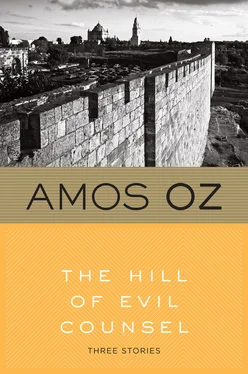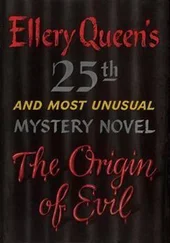"I'm his lieutenant. He's not in," I would say darkly.
And Mr. Nehamkin would add softly:
"It is quite impossible to know when the young man will return from his wanderings. It may be tomorrow, or the day after, or it may not be for many days."
Sometimes the girl would ask us to pass along a note or a message. These we would always refuse. There was no need. There was no point. And in any case, in times like these, who accepts letters from strangers?
The girl would either protest or apologize, and promise to call again some other time. She would hesitantly employ some such word as "misunderstanding" or "regret" and be on her way.
The moment her back was turned, Mr. Nehamkin would begin to justify our action in carefully chosen words:
"We told no lie; nor did we mislead the young lady. After all, slumber is a kind of distant wandering to remote worlds. As for billets-doux and notes, it is explicitly forbidden for a man to make himself a messenger of sin."
On such occasions he would also add some cautious prognostication prompted by the sight of the girl disappearing down the lane:
"She will surely soon find herself another young man, or maybe even two, according to the desire of her heart, whereas we have only one Ephraim. Therefore we shall continue to stand as a bulwark and as one man, the wretched poet Nehamkin and the excellent child Uriel. We shall never allow strangers to lead us astray. The aged poet and the youth shall hold the fort and guard the truth. Now return in peace to your wonted sport, and I shall go on my weary way. Each to his allotted task. O, that it may be granted us to behold the deliverance of Jerusalem."
2
Mr. Nehamkin was round and cuddly like a teddy bear. He dragged his feet and always walked with the aid of a carved stick. He looked as though he found his body a tiresome burden, as though he was forced to drag it around with him from place to place against his will, like a man carrying a heavy bundle that was gradually coming undone. The poet had discovered in Holy Writ one or two vague hints that in the Judean Desert, below Jerusalem, a green sea was hidden that no eye had ever beheld, not the Dead Sea, not a sea at all, but springs or wells of water, where were the Essenes and dreamers whom not even the Roman legions had been able to discover, and that was where he meant to go one of these days to shrug off his burden and set off lightened and freed along his own unique road.
He would say:
"How sorry I am for them. I could weep for them. Eyes have they but they see not."
Or:
"Their mouths speak but their ears hear not. The decree has gone forth. Their time has expired. The sword is already flashing. But as for them, they eat and drink. To outward appearances they are fearlessly made, but in truth they are merely blinded. Sorrow and compassion rend my heart."
At times it seemed as though Mr. Nehamkin's prophecies were almost about to come true. Once, in the doorway of the grocer's, he bent over and whispered to me that the King of Israel would soon rise up from his hiding place in the clefts of the mountain and slay the High Commissioner and seize his throne in Jerusalem. Another time it was revealed to him in a dream that Hitler was not dead but had hidden himself away among the murderous Bedouins in the darkness of the tents of Kedar. And in the middle of the summer holidays, a few days before the fast of Ab, he took me among the drought-smitten oleanders in the garden and urged me to water the plants because the feet of the Messenger were already standing at the gates of Jerusalem. At five o'clock on the following morning, the neighborhood was awakened by sounds of shouting and moaning. I leaped into my gym shorts and rushed outside with no shoes on. The three Grill boys, Boaz, Joab, and Abner, were standing in the middle of the lane beating furiously on a broken tar drum. Half-dressed women ran out of the houses. Somebody shouted a question, and other voices shouted back. The dogs were barking as though they were out of their minds. From the Faithful Remnant Synagogue, the Venerable Rabbi Zischa Lufban emerged, with a retinue of saints and scholars, and cried out repeatedly in an awe-inspiring voice:
"Come out, unclean! Come out in the name of G — d!"
But it was only excited neighbors who came out of every doorway, and many of them were in their pajamas. Helena Grill ran from one man to another, begging them at least to save the children. I caught sight of Mr. Nehamkin standing mildly and thoughtfully at the gate of his garden. He was wearing a dark-blue suit, a Polish tie, a flaming paper flower in his buttonhole, and a polite smile of forgiveness on his face; he was clasping his walking stick by its tiger's-head handle.
Mother chose to stay indoors. She sent father to wake up Mrs. Vishniak the pharmacist. Mother was always afraid that somebody might faint or that there might be an accident. But there was no accident. We saw a colorful procession wending its way toward us out of the east, from the direction of the Bokharan Quarter. At its head was a little old man with an unwashed air, riding on a little ass. He must have been ill, or perhaps only exhausted, because he was propped up on either side by Kurdish porters. They were lean and dark-bristled, with sacks tied around their waists.
Following close on the heels of the old man came the whole Bokharan Quarter, men, women, and children, just like the Exodus from Egypt we were learning about at school. Someone was beating on an old tin can, others were chanting guttural hymns, or mumbling prayers and incantations. The ass seemed to me piteously meek and wretched. It was far from healthy, and it wasn't even white. I looked around for Ephraim, but he was nowhere to be seen. His old father beamed at me, touched my hair, and said peacefully:
"Blessed are they that believe."
The procession, meanwhile, had turned off Zephaniah Street onto Amos Street. It continued westward along the stone wall of the Schneller Barracks and came to a halt outside the main gate, opposite the clock tower.
All the children of the neighborhood, myself among them, rushed from either flank of the procession up to the gate. Here we stopped, because the British sentries had cocked their Tommy guns and rested them, pointing at the crowd, on top of the sandbag barricade.
The Schneller tower was crowned by an indecipherable inscription in Gothic characters. The clock itself had stopped many years before. It chimed regularly every half hour, day and night, but its hands were lifeless. They pointed immovably to precisely three minutes past three. A rumor ran through the crowd: the stranger who had arrived out of nowhere at midnight would work a miracle and make time run backward. He would summon King David and all his horsemen out of the top of the tower. The massed troops of the ten lost tribes would come sweeping down from the mountains. The old Bokharan women started beating their breasts with their wrinkled fists. A cripple began to declaim, "This is the day which the Lord hath made," then suddenly thought better of it and fell silent. Together with Boaz, Joab, and Abner and all the other boys of the neighborhood, I chanted ecstatically:
"Free immigra-tion, He-brew state!"
"Woe upon me," cried Rabbi Lufban, but nobody heard him.
The British blocked the road with an armored car. An officer stood up in it holding a loudspeaker. He was presumably telling the crowd to disperse, but there must have been some flaw, since we could only see his lips moving. The noise died down. There was a silence like the still, small voice we had learned about at school, and in the silence birds and a cockcrowing far away. It was just before the dawn. The light was gray and blue. The cypress trees and the great water tower on top of Romema Hill seemed to be receding into the gentle mist. Then the old man straightened himself up on his ass,'drew a filthy handkerchief from the folds of his robe, and hawked and spat into it. The people were silent. He folded the handkerchief and put it away, raised his head, carefully put on a pair of spectacles, pointed to the clock or perhaps to the tower with a trembling finger, and mumbled some words that I did not catch; but I could see him swelling, reddening, coming to the boil, and suddenly he cried out in a clear, strong voice:
Читать дальше











